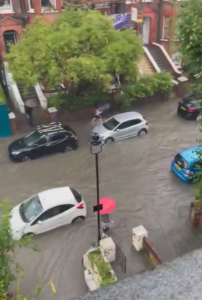Common ownership? Now Sir Keir says he is pragmatic over water reform
A review into last summer's flash flooding is underway
Thursday, 20th January 2022 — By Tom Foot

Holborn and St Pancras MP Sir Keir Starmer
SIR Keir Starmer has said he is opposed to the concept of nationalisation of utility and energy companies – amid concerns over rocketing bills.
His comments on a radio phone-in this week came just six months after he said he supported the idea of “common ownership” of the water supply following flash flooding in London last summer.
A review is now taking place into how to prevent further damage in similar heavy rain.
The disastrous downpour had sparked a debate over whether Thames Water should be reinvesting more of its profits into the network.
At that stage, the Holborn and St Pancras MP told the New Journal that the supply should instead be run “in the best interests of the environment and consumers”, adding: “Labour believes common ownership can do that.”

Flooding in South Hampstead last summer
While he did not elaborate on how energy and water companies could be structured, he said again this week that “we may have to look at the models for ownership of energy companies”.
But he also told listeners to Nick Ferrari’s morning show on LBC Radio that he would not take Labour towards policies of nationalisation and renationalisation – services essentially run by the state with directly-accountable politicians that can be voted in and out.
“There’s different ways of doing business, but the top-down version of nationalisation I don’t think really works and I’m not in favour of that,” he said.
Mr Starmer’s 10 pledges during his leadership campaign included “public services should be in public hands, not making profits for shareholders”, and he promised to support the “common ownership of rail, mail, energy and water”.
During one television debate, Mr Starmer raised his hand in support when candidates were asked if they supported “renationalising water and electricity”.
Renationalisation of energy companies was a central plank of former Labour leader Jeremy Corbyn’s Labour Party manifesto.
But Mr Starmer said he did not want to be seen to be pursuing it on “ideological” grounds, adding: “I do not agree with the argument that says we must be ideological.”
The opposition leader described himself as “pragmatic” about “common ownership”, saying: “Where common ownership is value for money for the taxpayer and delivers better services, then there should be common ownership.”
The debate over who profits from vital energy and water supplies has been reignited by the prospect of a price cap being altered this spring with everybody’s energy bills set to mushroom – potentially sending more people below the breadline.
The review of the floods, meanwhile, is now under way after Thames Water commissioned an independent review of what could be done to “future proof” its infrastructure.

South End Green after the downpour last July
Experts have warned that climate change will make similar downpours the “new normal”.
Roads in South End Green and South Hampstead were left deluged, while some people were forced to leave their basement flats, watching in horror as the water and sewage poured in. Compensation has not been paid out.
The London Flood Review new chair Mike Woolgar said: “Flooding like this is frightening for those affected and the mess, losses and damages for so many people underlines just how important this review is.”
Mr Woolgar is joined by Cardiff University Professor Roger Falconer and Lykke Leonardsen, from the International Water Association.
Thames Water retail director Warren Buckley said: “The severe weather patterns that led to some of the flooding incidents this summer look likely to become the new normal for the UK. “
While we can’t prevent every flood from happening, we know that we can do better and we must invest in resources today in order to build greater resilience.”
A final report will be presented at a public session “in the first half of 2022”